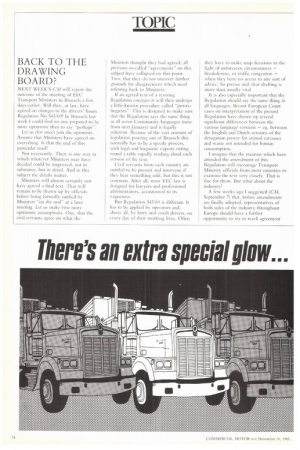TOPIC
Page 76

Page 77

If you've noticed an error in this article please click here to report it so we can fix it.
BACK TO THE DRAWING BOARD?
NEXT WEEK'S CM will report the outcome of the meeting of EEC Transport Ministers in Brussels a few days earlier. Will they, at List, have agreed on changes to the drivers' hours Regulation No 543/69? In Brussels last week I could find no one prepared to he more optimistic than to say "perhaps''.
Let us (for once) join the optimists. Assume that Ministers have agreed on everything. Is that the end of this particular road?
Not necessarily. There is one way in which whatever Ministers may have decided could be improved, not in substance, but in detail. And in this subject the details matter.
Ministers will almost certainly not have agreed a final text. That will remain to be drawn up by officials befbre being formally ratified hy Ministers "on the nodat a later meeting. Let us make two more optimistic assumptions. One, that the civil servants agree on what the Ministers thought they had agreed; all previous so-called "agreementson this subject have collapsed on this point. Two, that they do not uncover further grounds for disagreement which need referring back to Ministers.
If an agreed text of a revising Regulation emerges it will then undergo a little-known procedure called "juristslinguists-. This is designed to make sure that the Regulation says the same thing in all seven Community languages (nine Irons next January) and is legally coherent, Because of the vast amount of legislation pouring out of Brussels this normally has to be a speedy process, with legal and linguistic experts sitting round a table rapidly reading aloud each version of the text.
Civil servants from each country are entitled to be present and intervene if they hear SO/11Cilling odd, but this is not common. After all, most EEC law is designed for lawyers and professional administrators, accustomed to its vagueness.
But Regulation 543/69 is diffi:Tent. It has to be applied by operators and, above all, by lorry and coach drivers, on every day of their working lives. Often they have to make snap decisions in the light of unforeseen circumstances — breakdowns, or traffic congestion — when they have no access to any sort of advice. So precise and clear drafting is more than usually vital.
It is also especially important that the Regulation should say the same thing in all languages. Recent European Court cases on interpretation of the present Regulation have shown up several significant differences between the various language versions — eg, between the English and Dutch versions of the derogation power for animal carcasses and waste not intended For human consumption.
I imagine that the traumas which have attended the amendment of this Regulation will encourage Transport Ministry officials from most countries to examine the text very closely. That is line for them. But what about the industry?
A few weeks ago I suggested (CM, September 7) that, before amendments arc finally adopted, representatives of both sides of the industry throughout Europe should have a further opportunity to try to reach agreement among themselves.
1 learned in Brussels last week that my article had been read by those responsible fin the amendments, and had tilled them with horror. I can understand this. It is not a case of -the Eurocrat knows best-. The point is that the industry was consulted at great length over several years.
These consultations produced almost no points of agreement between the two sides. And some sessions degenerated into it slanging matches, either between employers and trade unionists, or between the industry and the Commission officials trying to find out what changes the industry wanted.
I was challenged on three points. l'irst, the package put to Ministers last week is the best that can he agreed. Second, there is no reason to think that the two sides of industry would agree in 1985 when they have consistently failed to ilo so since 1981. And third, further consultation would delay changes to legislation which everyone involved agrees is in urgent need of amendment.
The first point is at best questionable. The triple objectives set by Transport Ministers were flexibility, simplicity and
clarity. The changes which Ministers have just considered certainly increase flexibility, but at the cost o1. much greater complexity. Judgement on clarity will have to await the otticiil text, but complexity and Clarity are IRA natural allies.
Second, is it unrealistic to expect the in to agree on a better outcome? Certainly there is a natural conflict between employers and employees on this subject which makes agreement difficult to achieve even in a purely national context. 'rhose who doubt this should think back to the controversy surrounding the 1968 Transport Act.
But just as the knowledge that a man is about to be hanged concentrates the mind wondertially. so being faced with an unacceptable text which is on the point of becoming law might tbrce both sides of the industry to adopt a more accommodating attitude. The Bus and Coach Council has said that it prefers the present Regulation to the changes now on offer. Others might take similar, if less extreme, positions.
As for lost time, no one will be keen to re-open this particular can of worms once the lid has been screwed back on. So once the changes are thrmally adopted the amended Regulation will effectively be deep frozen for something like 10 years. A further few months' delay would be a small price to pay for a better outcome broadly acceptable to the industry.
So I repeat my suggestion. Between jurists-linguists nid fmmal adoption the industry should be given an opportunity to comment on the actual text of the amending Regulation. If nothing comes out of it only time will have been lost, and even that could be minimised by laying down a tight timetable. The subject is too important to be left to bureaucrats. however expert they may have become in the minutiae.












































































































